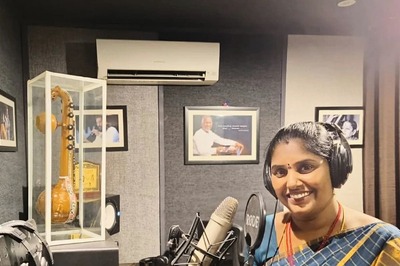
views
Moscow: Russia and the United States agreed to seek new peace talks with both sides to end Syria's civil war, but opposition leaders were sceptical on Wednesday of an initiative they fear might let President Bashar al-Assad hang on to power.
Mindful the conflict may be far from over, Britain has urged fellow European Union states to lift an arms embargo, arguing it would strengthen those rebel groups favoured by Western powers.
Visiting Moscow after Israel bombed sites near Damascus and as President Barack Obama also faces renewed calls to arm the rebels, US Secretary of State John Kerry said late on Tuesday that Russia agreed to work on a conference in the coming weeks.
An East-West disagreement that has seen some of the frostiest exchanges between Washington and Moscow since the Cold War has deadlocked UN efforts to settle the Syrian conflict for two years, so any rapprochement could bring an international common front closer than it has been for many months.
Israeli air strikes, reports of the use of chemical weapons and the increasing prominence of al Qaeda-linked militants among the rebels have all added to international urgency for an end to a war that has killed more than 70,000 people.
UN Secretary-General Ban Ki-moon on Wednesday welcomed the announcement by Kerry and Russian Foreign Minister Sergei Lavrov.
"The Secretary-General and Joint Special Representative (Lakhdar) Brahimi have asserted from the outset their conviction that a negotiated political solution is the only way to end this prolonged and ever-deepening crisis, the UN statement said.
But with Syria's factional and sectarian hatreds more entrenched than ever, it is far from clear the warring parties are ready to negotiate with each other. Most opposition figures have ruled out talks unless Assad and his inner circle are excluded from any future transitional government.
"I believe the opposition would find it impossible to hold talks over a government that still had Assad at its head," said Samir Nashar of the opposition's umbrella National Coalition.
"Before making any decisions, we need to know what Assad's role would be. That point has been left vague, we believe intentionally so, in order to try to drag the opposition into talks before a decision on that is made."
In the past, the United States has backed opposition demands that Assad be excluded from any future government, while Russia has said that must be for Syrians to decide, a formula the opposition believes could be used to keep Assad in power.
Opposition members said they were concerned by comments from Kerry in Moscow, echoing Russia, that the decision on who takes part in a transitional government should be left to Syrians.
"Syrians are worried that the United States is advancing its own interests with Russia, using the blood and suffering of the Syrian people," said National Coalition member Ahmed Ramadan.
Inside Syria, where rebel groups have disparate views, a military commander, Abdeljabbar al-Oqaidi, told Reuters, "If the regime were present, I do not believe we would want to attend."
There was no immediate response from the Syrian government, which has offered reforms but dismisses those fighting it as terrorists and puppets of outside powers - the West, Turkey and Arab states opposed to Assad's ally Iran.
If fears of an escalation of the war are driving new peace moves, they have also set some Western powers looking again at their military options. Washington said last week it was rethinking its opposition to arming the rebels, and it emerged on Wednesday that Britain had been lobbying the EU to let it do so, too.
Several EU governments are resisting French and British efforts to get the embargo lifted, concerned the move could escalate the two-year-old conflict.
In a paper seen by Reuters, London suggested ways the ban could be amended to get arms to the National Coalition. Existing sanctions expire on June 1, 2013. With France, the other main military power in the bloc, Britain is trying to persuade Spain, Austria, Sweden and others to ease opposition to arming the rebels.
But with the prospect of the conflict spilling across a volatile region central to global energy supplies and transit routes, major powers also have, as Kerry told Putin on Tuesday, "very significant common interests" in pushing for a settlement.
"The alternative," Kerry later told a joint news conference with Lavrov, "is that Syria heads closer to an abyss, if not over the abyss and into chaos".
Both sides fear a failed state in Syria could provide a base for hostile militants willing to strike around the world.
In June 2012, at a conference in Geneva, Washington and Moscow agreed on the need for a transitional government in Syria, but diplomacy has foundered since then, and the mediator of the Geneva conference, former UN Secretary-General Kofi Annan, quit in despair, saying differences among powers were too wide.
Kerry said the conference might be held as early as this month, although no venue has been set.
Russia, backed by China, has vetoed three UN Security Council resolutions hostile to Assad. Alarmed at Western powers' use of a UN mandate to oust Muammar Gaddafi in Libya, Moscow and Beijing are wary of such interference in their own affairs.
Recent developments have focused minds on the risks of wider war in the Middle East.
The White House said last month that Assad's troops probably used chemical weapons - which Obama has called a "red line" that would mandate a strong, if unspecified, response. The government and rebels each accuse the other of using poison gas, a charge both sides deny. British Prime Minister David Cameron said on Wednesday there was evidence Assad's forces "continue" to use sarin gas.
But despite pleading from the opposition, Western leaders have been reluctant to weigh in by arming the rebels, especially as Islamist fighters have pledged allegiance to al Qaeda, highlighting the risk to the West that a poorly managed change of leadership in Syria could bring hostile militants to power.
Israeli air strikes in recent days - which Israeli officials said hit Iranian arms headed for Assad and Tehran's Lebanese allies Hezbollah - underlined the risk of cross-border conflict.
The violence has inflamed a confrontation between Sunni and Shi'ite Muslims in the Middle East, with Shi'ite Iran supporting Assad, and Sunni powers like Saudi Arabia backing the rebels.
Tehran warned of unforeseeable consequences if Assad were toppled and said only a political deal would avert a regional conflagration: "God forbid, if there is any vacuum in Syria, these negative consequences will affect all countries," Foreign Minister Ali Akbar Salehi said. "No one knows what will happen."
Diplomatic sources in Moscow made clear the latest push for peace was being driven by growing alarm following the Israeli air raids, the possibility of foreign arms pouring into Syria and the possible use of chemical weapons.
Moscow and Washington have also signalled they want to improve cooperation on security matters since the Boston Marathon bombings, which US officials suspect was carried out by ethnic
Chechens who had lived in Russia. US officials said FBI chief Robert Mueller had been in Moscow on Tuesday to discuss the bombings, but gave no details.
In a further sign of Washington's efforts to improve ties with Russia, Kerry avoided any sharp public criticism of Moscow's human rights record when he met civil rights activists in the Russian capital on Wednesday before his departure.
In Syria, Internet connections and phones to the outside world were restored after a day-long blackout that officials put down to a technical fault on a cable but which opposition activists said was deliberately imposed for military operations.

















Comments
0 comment